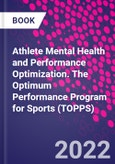Athlete Mental Health and Performance Optimization: The Optimum Performance Program for Sports (TOPPS)introduces TOPPS, which provides structured protocols to assist with recruitment, engagement, screening, assessment and performance optimization. The book presents step-by-step instructional guidelines, real-world case examples, screening and assessment questionnaires, scoring instructions, intervention handouts and worksheets that complement intervention. TOPPS has demonstrated significantly improved relationships with teammates and coaches, decreased substance use and psychiatric symptoms, and decreased factors interfering with sport performance. These results have been sustained in follow-up and has been shown to have improved outcomes regardless of mental health diagnostic severity.
The Book's first three chapters introduce performance optimization orientation, theories and evidence supporting TOPPS, general assessment and intervention approaches, psychometrically-validated measures and strategies used to address culture, methods of establishing a culture of optimization and requisite infrastructure within the respective system, and therapeutic style, techniques and implementation strategies. Remaining chapters show how to implement TOPPS.
Please Note: This is an On Demand product, delivery may take up to 11 working days after payment has been received.
Table of Contents
1. Establishing a Culture of Optimization within the System
2. Optimizing the System's Infrastructure, Recruitment and Engagement
3. Optimizing Therapeutic Style and Implementation Strategies
4. Optimal Mental Health and Sport Performance Screens/Assessments
5. Orienting Athletes and their Significant Others to Optimization
6. Establishing Optimal Agendas
7. The Optimum Performance Plan
8. Establishing Optimal Dynamic Goals
9. Establishing Optimal Motivation
10. Optimizing Relationships with Appreciation and Gratitude
11. Optimizing Communication with Positive Requests
12. Establishing the Optimum Environment
13. Establishing Optimal Self-Control
14. Discovering the Optimum Dream Job
15. Optimizing Job Getting Skills
16. Optimizing Financial Management
17. Concluding Performance Programming
18. Applications to Mental Health Syndromes Common in Athletes








